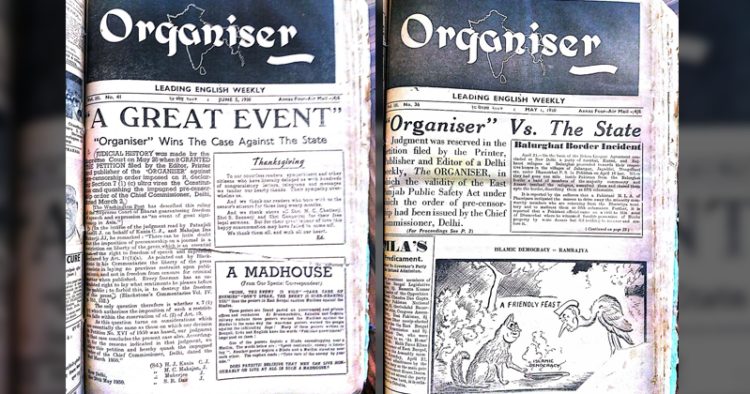The Congress party in the last few years has been harping all along that the freedom of media has been curbed and there is “Godi Media” who is always speaking in favour the incumbent government which is led by Prime Minister Narendra Modi. Moreover, in its manifesto, the Congress party has mentioned, “We promise to restore freedom of speech and expression including full freedom of the media.”
The point that needs to be delved here is to look back into history and see how it was the Congress party, post independence under the leadership of Pandit Jawharlal Nehru, strangulated the media by curbing its freedom of speech merely to appease Pakistan and remain in its good book.
Post partition of Bharat, it was Organiser, which from its inception championed freedom of press. It exposed Nehru Government for being soft towards Pakistan even when Hindus were massacred in East Pakistan in the wake of Partition. This clearly shows how Nehru strangulated the freedoom of speech and expression.
No sooner than India became Republic on January 26, 1950, Prime Minister Nehru in 1951 brought in the First Amendment to the Constitution, drastically curbing the freedom of expression and speech and clamped down on voices critical of the Government. Nehru was upset with the Organiser because the publication was quite critical of the Nehru Government in the wake of the Partition of India in 1947 and later because of widespread communal violence against Hindus in Dhaka (erstwhile East Pakistan) and had sought that Muslims evacuate property to be distributed among Hindu refugees. Nehru was criticised for proposing confidence-building measures with Pakistani Prime Minister Liaquat Ali Khan, even though Hindus were being targeted there.
The Organiser published Nehru and Liaquat cartoons in a report ‘Villains vs Fools’. Organiser had written that “the villainy of Pakistan is matched only by our idiocy”. On March 2, 1950, a gag order was issued against the Organiser by the Delhi Chief Commissioner, ordering Editor KR Malkani and publisher Brij Bhushan to submit all content related to communal issues or Pakistan including cartoons for Government approval. However, the bold Editor Malkani didn’t budge an inch and wrote an editorial on March 13, 1950 that read: “If the administration earnestly wants ugly facts not to appear in the press, the only right and honest course for it is effectively to exert itself for the non-occurrence of such brutal facts. Suppression of facts is no solution to the Bengal tragedy. Surely the government does not hope to extinguish a volcano by squatting more tightly on its crater”.
Despite fierce resistance from within his party as well as in Parliament and media, Nehru moved the Constitution (First Amendment) Act, 1951, on May 10, 1951 and got it enacted on June 18, 1951. Interestingly, this amendment was triggered by various factors, including two landmark judgments of the Supreme Court which changed the contours of the freedom of speech and expression as it stands today. This is a part of history that Supreme Court Justice M Patanjali Sastri had to pay a huge price for it. He was not made chief justice of the Supreme Court like Mrs Indira Gandhi deprived Justice HR Khanna of his chance during the Emergency. This is another matter that after the entire Supreme Court threatened to resign, Nehru had to succumb, and Justice Sastri became the CJI and served till 1954.
Amidst cries for an ‘Akhand Bharat’, Organizer had carried two articles consecutively titled “Six Questions” and “Villains versus Fools,” criticising the government for wanting to administer claims to property evacuated by Muslims on an individual basis rather than disburse it to the Hindu refugees. It was alleged in the notice that Organizer was publishing material which was communal in nature, and it directed the magazine to submit all material to the government for prior censorship.It is in this regard, that the Congress is clearly repeating what Nehru did as they opposed the Citizenship Amendment Act, which aims to provide citizenship to the refugees coming from Pakistan.
Today, when we look at the Congress Manifesto where they are talking about the freedom of speech for the media, it is in this regard that the history needs to be revisited as they are merely repeating what Nehru did.



















Comments